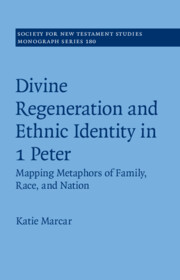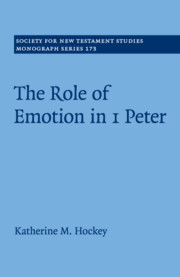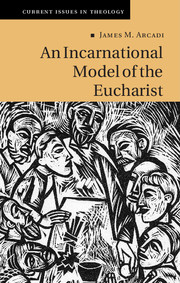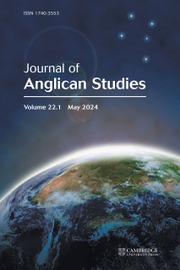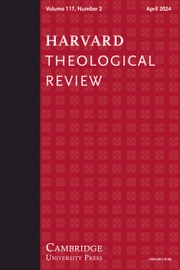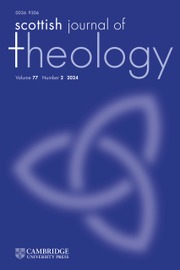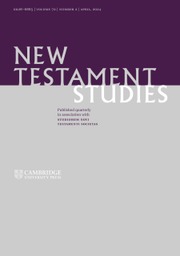Divine Regeneration and Ethnic Identity in 1 Peter
Mapping Metaphors of Family, Race, and Nation
Part of Society for New Testament Studies Monograph Series
- Author: Katie Marcar, University of Otago, New Zealand
- Date Published: June 2022
- availability: Not yet published - available from October 2024
- format: Hardback
- isbn: 9781108841283
Hardback
Other available formats:
eBook
Looking for an inspection copy?
This title is not currently available for inspection. However, if you are interested in the title for your course we can consider offering an inspection copy. To register your interest please contact [email protected] providing details of the course you are teaching.
-
In this book, Katie Marcar examines how 1 Peter draws together metaphors of family, ethnicity, temple, and priesthood to describe Christian identity. She examines the precedents for these metaphors in Second Temple Judaism and early Christianity in order to highlight the originality, creativity and theological depth of the text. She then explores how these metaphors are combined and developed in 1 Peter to create complex, narratival metaphors which reframe believers' understanding of themselves, their community, and their world. Integrating insights on ethnicity and race in the ancient and modern world, as well as insights from metaphor studies, Marcar examines why it is important for Christians to think of themselves as one family and ethnic group. Marcar concludes by distilling the metaphors of divine regeneration down to their underlying systematic metaphors.
Read more- Introduces biblical scholars to the Metaphor Identification Procedure (MIP), an objective way of identifying the presence of metaphor in a text as well as other tools for analyzing metaphors in a text
- Provides examples of inter-disciplinary and multi-disciplinary research in action, drawing together New Testament, Second Temple Judaism, Classics, and metaphor studies
- Offers detailed exegesis of 1 Peter using traditional and innovative approaches to the text
Reviews & endorsements
'Marcar has produced an excellent addition to the literature on 1 Peter, and her in-depth analysis of intertestamental and first-century background literature concerning the themes in play has great value for anyone researching those topics.' Allyson Presswood Nance, Journal of the Evangelical Theological Society
Customer reviews
Not yet reviewed
Be the first to review
Review was not posted due to profanity
×Product details
- Date Published: June 2022
- format: Hardback
- isbn: 9781108841283
- length: 275 pages
- dimensions: 228 x 151 x 6 mm
- weight: 0.164kg
- availability: Not yet published - available from October 2024
Table of Contents
Introduction: Why this new genos? Christian Ethnic Identity in 1 Peter: Why this new genos?
1. Ethnicity ancient and modern
2. A field guide to metaphors
3. The structure of 1 Peter: A bird's eye view
4. Begotten anew: Divine begetting in 1 Peter
5. Seed metaphors in Jewish and early Christian literature
6. New born babies and spiritual milk in 1 Peter 2:1-3
7. From house to house of God: House and cultic language in 1 Peter 2:4-10
8. From (Re)Generation to Ethnos: Mapping systematic metaphors in 1 Peter
9. Conclusion: The divine regeneration metaphor in 1 Peter
Appendix 1: The language of rebirth in Rabbinic Judaism.
Sorry, this resource is locked
Please register or sign in to request access. If you are having problems accessing these resources please email [email protected]
Register Sign in» Proceed
You are now leaving the Cambridge University Press website. Your eBook purchase and download will be completed by our partner www.ebooks.com. Please see the permission section of the www.ebooks.com catalogue page for details of the print & copy limits on our eBooks.
Continue ×Are you sure you want to delete your account?
This cannot be undone.
Thank you for your feedback which will help us improve our service.
If you requested a response, we will make sure to get back to you shortly.
×
